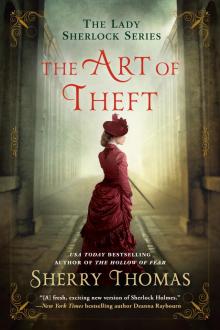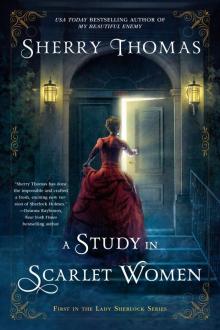- Home
- Sherry Thomas
A Study In Scarlet Women Page 22
A Study In Scarlet Women Read online
Page 22
Their first actual client at 18 Upper Baker Street was a young man with a pink, eager face. He had been courting a lovely young lady. Her birthday was in three weeks and he had asked what he ought to give her. In response she had given him a riddle to test the depth of his devotion.
What I’d like to receive is to be found at the beginning of the year, in the middle of the longest word in the dictionary, at the bottom of the stairs, and the end of eternity. Does this turn you upside down? Then you must flip yourself the right way around.
Charlotte disappeared into “Sherlock’s” bedroom for three minutes, then returned with a big smile on her face. “My brother has solved the riddle for you. If you take the letter at the beginning of the word ‘year’—”
“I did try that route earlier,” said the young man. “The beginning of the word ‘year’ yields the letter y. Bottom of the stairs would give me s, and end of eternity another y. But what’s the longest word in the dictionary?”
“That would depend on the dictionary, wouldn’t it? But the longest word in the word ‘dictionary’ is itself.”
The young man gasped with delight. “And the letter in the middle of the word is . . . ah . . .”
Charlotte waited patiently until he exclaimed, “O! It’s o.”
“I do believe you are correct, sir.”
“But what do y, o, s, and y give me?”
“Your young lady did warn you that everything might be upside down, did she not? So let’s reverse her directions, the ones that are reversible in any case. If we take the end of the year, the top of the stairs, and the beginning of eternity—middle of the dictionary is still middle of the dictionary—then what do we have?”
The young man thought for a minute. “R, o, s, e. Roses, she wants roses! I can get her roses!”
He left beaming. Mrs. Watson, who had volunteered to look after the administrative aspects of their enterprise, accompanied him out.
Since neither Charlotte nor Mrs. Watson had any firsthand knowledge of what would be a fair price for Sherlock Holmes’s services, the latter had decided to make it seven shillings for a meeting that solved the problem. It’s a bit more than what a doctor would charge for a call, but not much more. And there’s only one Sherlock Holmes.
Mrs. Watson returned, beaming from ear to ear. Charlotte rose from her chair. “I can’t believe it. He paid!”
Mrs. Watson had reassured her that of course her clients would pay. But to Charlotte the entire enterprise still felt like a mirage, an elaborate fata morgana castle in the sky. That she might turn nothing more than a few minutes of time and a bit of thinking into actual money—enough money for a week of room and board in a halfway-respectable place!
“Oh, yes, he paid. Most willingly, too.”
The mischief and satisfaction on Mrs. Watson’s face . . . Charlotte’s jaw dropped. “What did you tell him my fee was?”
“A guinea.”
A guinea was twenty-one shillings, three times what they had agreed to charge. Charlotte gaped at Mrs. Watson. “But that’s a fortune!”
“Yes, but allow me to know better in this case. He confirmed that he is very well off, did he not, when you told him what you knew about him?”
The young man’s family was successful in manufacturing. But still, a guinea. “It isn’t so much about what he can afford but more about, well, not overcharging.”
Mrs. Watson pressed the heavy coin into Charlotte’s palm and closed her fingers around it. “Remind yourself that you’re far more likely to undercharge than overcharge, my dear, because you don’t yet understand your own value and you’ve never been taught to demand your full worth.” She smiled. “That’s why I appointed myself the bursar of this operation, because I’ve had to learn both.”
Their second client was a timid woman of about thirty who had misplaced an emerald ring her husband had given her and was desperate to find it before he returned home from a business trip. Charlotte located the ring at the bottom of the woman’s hatpin holder. Mrs. Watson charged her nine shillings plus outlay for their return trip in a hansom cab, which the client was more than happy to pay, besides gifting them with a ham pie, for “poor Mr. Holmes, who can’t leave his room.”
“If this keeps up, we might bring in more than five hundred pounds a year,” Charlotte marveled, as they settled into a cab.
Mrs. Watson patted the aigrette on her bonnet. “Five hundred pounds isn’t an astonishing sum, my dear Miss Holmes.”
“But it’s as much as I ever hoped to make, after many years of school, training, and experience!”
“Well, we may not bring in five hundred a year, since we may not always have a steady supply of clients. Or we could bring in much more, if we have a few dukes and princes whose secretaries I’ll bill fifty quid a piece,” said Mrs. Watson with great relish. “And don’t you worry that I’ll overcharge them. Not every nobleman is in dire financial straits. The Duke of Westminster has an income of two hundred fifty thousand pounds a year.”
Charlotte couldn’t help laughing. “My dear lady, I feared to impose on your kindness. I see now that I needn’t have worried. You are a shark!”
Mrs. Watson preened a little, evidently pleased by Charlotte’s observation. “A shark with a good nose for money in the water but, let’s say, rather soft teeth.”
“Miss Livia,” said the maid, “there’s a woman to see you. She says her name is Rajkumari Indira.”
Livia looked up from the frame of embroidery on which she hadn’t made any progress in days. “What?”
Occasionally one did see an Indian princess in London, but the Holmeses had few ties with the subcontinent and did not move in the kinds of circles that hobnobbed with foreign dignitaries. Why in the world would one call on her?
In the parlor, a woman draped in scarlet and gold silk stood at the window, her back to the room, her hair covered by a very long shawl that had already wrapped around her person once. At Livia’s entry, she turned around, the shawl drawn across her face, concealing everything except her eyes.
When she saw that Livia had come alone, she dropped her hand from the edge of the shawl. Charlotte!
Charlotte placed a finger over her lips, signaling Livia to be quiet. Livia ran across the room and embraced her sister.
“Oh, Charlotte!” Then she pulled back. “My goodness, you are practically naked!”
The blouse Charlotte wore ended just beneath her breasts. The shawl, drawn diagonally across the body from hip to shoulders and then back around, covered most of the exposed portions of Charlotte’s torso, but from the side one could easily see four inches of skin.
“It’s so nobody looks at my face.” Charlotte laid a hand on Livia’s arm. “Are you all right, Livia?”
“I’m well enough. People don’t actually believe that I did away with Lady Shrewsbury, but it gives them something to speculate about in the meanwhile.”
The situation was a little less promising than that. The discovery of arsenic had tongues wagging that while Mr. Sackville might have been murdered, he had to have been done in by someone local, most likely one of his servants—leading to the current consensus that his death had nothing to do with Lady Shrewsbury’s and Lady Amelia’s.
With the suspicion for those latter deaths once again falling squarely on Livia and Sir Henry, respectively—which must be the reason Charlotte had taken the risk to come see her.
“You’ve become too thin,” said Charlotte softly.
“It was always more enjoyable to watch you eat than to eat myself.” Livia took Charlotte’s face in her hands. “At least you haven’t become too thin.”
“Mrs. Watson feeds me ’round the clock and I haven’t turned anything down. But at the rate I’m going, within the week I’ll reach Maximum Tolerable Chins. Then I’ll be obliged to give up this reckless dining.”
Livia chuckled.
&nbs
p; Charlotte took Livia’s hands in her own. “If only there had been an inquest, at least in Lady Shrewsbury’s case.”
Livia sighed.
“Don’t worry.” Charlotte came beside Livia and placed an arm around her shoulder. “Inspector Treadles will get to the bottom of this. He is very good at what he does.”
Charlotte didn’t possess the instinct to comfort. Livia well knew this: When they’d been girls, Charlotte remained in her corner of the room and observed as Livia battled with her sometimes overwhelming feelings of inadequacy and insignificance. But over the years her sister had learned that it made Livia feel less alone, less despair stricken, to be gently stroked on the back. Or embraced. Or patted on the arm.
Really, any kind of contact at all.
And the odd thing was, knowing that Charlotte was not naturally inclined to physical closeness made her touches not less effective, but more—they were not a reflexive reaction to the distress of another, but a considered one.
Livia leaned on her sister and finally gave voice to the fearful thought that tumbled day and night in the back of her head. “What if Inspector Treadles gets to the bottom of it, only to find out that Mr. Sackville’s butler did it?”
Leaving Livia forevermore known as the woman who probably had something to do with Lady Shrewsbury’s death.
Her entire life she had been frustrated by her invisibility. At home she was the last daughter her parents remembered. In Society the women were prettier, livelier, younger, cleverer, or even more pathetic—she knew of at least one instance in which a widower offered for a plain, penniless spinster who would otherwise have to endure a lifetime under the thumb of a tyrannical brother. Whereas Livia always seemed to carry her own special shield of obscurity everywhere she went, behind which she could stand in the middle of a room and not be noticed.
How she’d yearned to be the center of attention.
And how cruel to be taught this way that she ought to be careful what she wished for.
“Inspector Treadles will apprehend real suspects in no time,” said Charlotte. “You have my assurances as a consultant to the Criminal Investigation Department.”
Livia snorted. “This reminds me. I saw the advert for Sherlock Holmes’s services. Are you really taking clients? How do you keep up the pretense?”
Charlotte explained the procedure she and Mrs. Watson had established. “I saw my first two clients this morning. We already made thirty shillings.”
“So fast?”
“Yes. And I have another client lined up for the afternoon.”
She opened her reticule, took out a small pouch, and put it in Livia’s hand. Livia didn’t have to open the pouch to know it was the jewelry and money she’d given Charlotte the night she had run away.
She gave it back. “It’s too early. You don’t know that you’ll still have clients in a week—or a month. And I still have reservations about this Mrs. Watson.”
Charlotte shook her head. “I’m more worried about you now than I am about myself. You take it. Mrs. Watson has invested her own funds to set up Sherlock Holmes’s operation, so she has every motive to keep me around and in good shape until she at least recoups her cost.”
Livia stared down at the pouch. “Oh, Charlotte, what is going to happen to all of us?”
“According to my crystal ball, Mrs. Watson will make a fortune. I will make a name. You will clear your name, as will Papa. And Mamma will feel relieved for a short while and then more aggrieved than ever.”
Oh God, if only. If only. “While we are looking through your crystal ball, can you tell me if I’ll always be stuck at home with Mamma and Papa?”
“Only if you want to be, Livia,” said Charlotte softly. “Only if you want to be.”
“Lady Sheridan, thank you for seeing me on such short notice,” said Inspector Treadles.
Lady Sheridan smiled without warmth. “Your note did not leave much room for refusal or delays, Inspector.”
She was a small, fine-featured woman, her grey hair swept back in a precise and severe chignon. But whereas her husband was hale and vigorous, Lady Sheridan reminded Treadles of nothing so much as her town house, a once-beautiful entity made worn by time and adverse circumstances.
“I apologize for the necessity of the intrusion,” Treadles said as gently as he could. “But we have an eyewitness account of your return to Paddington Station from a Great Western train. The eyewitness, who has been interviewed by my colleague, is entirely certain that she saw you on the day Mr. Sackville died—and even produced her diary entry to bolster her claim.”
“Lady Avery kindly sent a message to that effect.” A note of irony lined her words. “I did return to London that day. I am one of the patronesses of the Young Women’s Christian Association and attended the opening of a new center in Bath, which took place before numerous witnesses. Then I got on a train the next day and came back.”
“You didn’t go to Stanwell Moot?” It would have been a fairly convenient side trip from Bath.
“I assure you, Inspector, I never set foot in Stanwell Moot.”
Unfortunately, that was probably true. Constable Perkins’s conscientious legwork had not produced a shred of evidence that either of the Sheridans had ever visited the village or its vicinities.
“I was also told that you were once very fond of Mr. Sackville. That you lamented that he had drifted away from the family. Lady Avery said you claimed not to know why he cut off contact, but there is a very real possibility that you knew and chose not to tell her, as she was liable to repeat what she learned to others.”
“An astute observation.” The expression on Lady Sheridan’s face was almost a smile.
Treadles found himself warming up to the old woman at this sign of almost approval. He had to issue a stern reminder to himself that she was still a prime suspect. “Can you elucidate us as to why Mr. Sackville drifted away from the family?”
Lady Sheridan waved a weary hand. “One of those tedious arguments between brothers about their manly honor—I can’t recall how it began.”
Her dismissal of the matter seemed genuine enough. Treadles tried a different angle. “Lord Sheridan insisted that there was no estrangement.”
“And I believe that he believed so. Until Harrington died he was probably still expecting his brother to ring the bell and admit he’d been wrong all these years.”
Could it truly be so insignificant, an argument that caused formerly affectionate brothers to become strangers?
“Mr. Sackville’s passing does not seem to have grieved you, my lady.”
“I have been brought up to never grieve in public. In any case, we lost him long ago—my husband might not have realized but I did, eventually. I already grieved.”
Her voice was hard.
Inspector Treadles rose and inclined his head. “Thank you, my lady. That will be all.”
“Breathe in,” Mrs. Watson ordered.
Charlotte sucked in hard. Mrs. Watson yanked on the laces of her corset. On Sherlock Holmes’s supposed sickbed lay a tangle of scarlet and gold silk, the blouse, skirt, and scarf of the ghagra choli that she had just taken off. With Mrs. Watson tying the corset laces, Charlotte stepped into her petticoats and peeked at the street below from behind the curtain.
She had been followed from the Holmes house to 18 Upper Baker Street, she was fairly certain of that. But now there was no one—and no carriages—loitering below.
The doorbell rang just as she finished dressing. Charlotte put the pile of ghagra choli into an armoire and took a seat in the parlor; Mrs. Watson went down to open the door for Mrs. Marbleton.
Her inquiry had been one of the earliest Sherlock Holmes responded to.
Dear Mr. Holmes,
I am concerned for my husband.
Mr. Marbleton writes twice a day when he is away. If he feels postal services are
too slow, he cables in addition. And anytime circumstances permit, he telephones, in spite of my protest that it is hardly the thing to do for the lady of the house to stand in a passageway and shout her more tender sentiments for all to hear.
I have not heard from him in thirty-six hours. Instead, a strange letter bearing no return address has come. I cannot puzzle out what it is trying to tell me: The sentences make sense, but why would anyone think that I have the remotest interest in animal husbandry?
The letter is typed, on plain paper. I enclose a replica I have made of this letter in the hope that you may be able to advise me.
Yours,
Mrs. C. B. Marbleton
Charlotte had written back immediately.
Dear Mrs. Marbleton,
I am very sorry to hear about your husband. Although I cannot ascertain his whereabouts, I can tell you something of the note you received.
The text, while coherent, has no significance. However, by examining the punctuation—namely the hyphens and the full stops—it emerges that the letter contains a message in Morse code.
Decoded, it says Call for me at general.
Should you have further need of my service, you are welcome to call upon 18 Upper Baker Street at four o’clock tomorrow afternoon.
Your servant,
Sherlock Holmes
And now Mrs. Marbleton had arrived, a woman who had been without news of her husband for more than seventy-two hours, when she normally heard from him several times a day when he was away.
She was pale and tense, but otherwise willowy and handsome, a woman in her forties, her visiting dress of an elegant simplicity that Livia would have much lauded. Pleasantries were exchanged. Charlotte gave the by now standard speech concerning her “brother” in the next room. Mrs. Marbleton, with hands clutched tightly together in her lap, tendered her best wishes for Mr. Holmes’s health.

_preview.jpg) Claiming the Duchess (Fitzhugh Trilogy Book 0.5)
Claiming the Duchess (Fitzhugh Trilogy Book 0.5) The Art of Theft
The Art of Theft The Magnolia Sword: A Ballad of Mulan
The Magnolia Sword: A Ballad of Mulan A Study In Scarlet Women
A Study In Scarlet Women The Hollow of Fear
The Hollow of Fear The Magnolia Sword
The Magnolia Sword Beguiling the Beauty ft-1
Beguiling the Beauty ft-1 The Heart is a Universe
The Heart is a Universe The Hidden Blade: A Prequel to My Beautiful Enemy (Heart of Blade)
The Hidden Blade: A Prequel to My Beautiful Enemy (Heart of Blade) Ravishing the Heiress ft-2
Ravishing the Heiress ft-2 The Immortal Heights
The Immortal Heights The Hidden Blade
The Hidden Blade Ravishing the Heiress
Ravishing the Heiress Tempting the Bride
Tempting the Bride The Luckiest Lady in London
The Luckiest Lady in London The Bride of Larkspear: A Fitzhugh Trilogy Erotic Novella
The Bride of Larkspear: A Fitzhugh Trilogy Erotic Novella Claiming the Duchess
Claiming the Duchess The One in My Heart
The One in My Heart His At Night
His At Night A Dance in Moonlight
A Dance in Moonlight A Conspiracy in Belgravia
A Conspiracy in Belgravia Not Quite a Husband
Not Quite a Husband